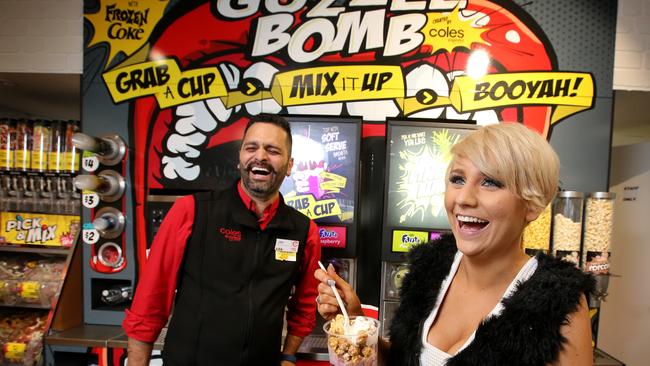Coles fires shots at 7-Eleven in coffee war
7-ELEVEN’S $1 coffee is facing a challenger in Coles, which is launching its own 80c version and a revamped convenience format.

7-ELEVEN’S $1 coffee is facing a challenger in Coles, which is undercutting the chain as it launches its own revamped convenience store format.
Coles Express is piloting the new convenience offering, dubbed “Big Yum at Little Coles”, at three Melbourne service stations in Kew, South Yarra and Windsor.
As well as 80c coffee, the fully rebranded stores will offer a new and extended range of healthier options including bananas, wraps, handmade sandwiches, sushi, salads and ready-made meals from the new Coles Brand convenience range.
They will also stock a wider range of bakery items including doughnuts, muffins and croissants, a pick-and-mix nut station, a “Guzzle Bomb” frozen drink machine, and a range of grocery, household and personal care items.
Crucially, all non-food products will move to Coles’ Every Day pricing, “meaning customers can get the same great value from Coles Express as they do at their local Coles supermarket”, a spokesman said.
The move will put further pressure on the $4.4 billion convenience store industry, where the growing dominance of Coles and Woolworths is tipped to push down revenue by an annualised two per cent over the five years to 2015-16, according to market research firm IBISWorld
“We are closely watching the performance of these proof of concept sites and will look to incorporate successful elements of the format elsewhere in the store network,’’ Simon McDowell, director of Coles Express, told The Australian.
It comes after Coles managing director John Durkan dismissed small-format stores as a “buzzword”, saying the retailer did “not have a burning ambition to open tiny little stores on high streets”.
“They’re always more costly to serve, generally they’re higher priced, and you need hundreds of them to have a sizeable EBIT return to your business — so it’s not a high priority,” he said at the Wesfarmers annual strategy briefing in June.
“If we can build them out of our Coles Express business we will do so.”
Mark McKenzie, chief executive of ACAPMA, the national peak body representing fuel and convenience retailers, said the move to supermarket pricing would put further pressure on the convenience sector.
“That will certainly shake up the market,” he said. “A whole bunch of businesses will be concerned, but that’s the nature of competition.”
Mr McKenzie said many of the medium-sized fuel retailers with around 10 to 12 sites were part of co-operative buying groups which allowed them to still compete with the supermarkets.
“The whole idea of convenience has been that instead of going to the supermarket, you pay slightly more as a premium for your time,” he said.
“There’s going to be a question about how effective [the low pricing] might be.”
Mr McKenzie said the industry, which consists of around 6400 sites across the country, was undergoing a “seismic shift” as convenience becomes the key battleground.
According to figures from the Australian Competition and Consumer Commission, the average margin over the past 10 years was 2.2 cents in gross profit per litre of fuel. The average motorist fills 40L, meaning the net profit per customer is 88 cents.
“Within that context there is a very strong rule of thumb in the industry that says 80 per cent of my revenue comes from fuel but it only accounts for 60 per cent of my profit,” Mr McKenzie said.
“Convenience accounts for 20 per cent of my revenue but accounts for 40 per cent of my profit. The way these businesses stay alive is when you and I go in and buy chips, chocs and drinks.”
In the ‘70s and ‘80s the industry was fuel and auto repair, but as cars became more reliable and dealerships took a greater share of service revenue, the entire industry has transitioned to fuel and convenience.
“We’re now seeing not just fuel and grocery but fast food, with Subway and McDonald’s outlets, partnerships with bakeries, fresh food is starting to appear,” he said.
“I expect the service station concept in Australia is going to continue to evolve. The way to think about the industry is these 6400 sites in the country are effectively strategic pieces of real estate that can be used for all sorts of things.”




